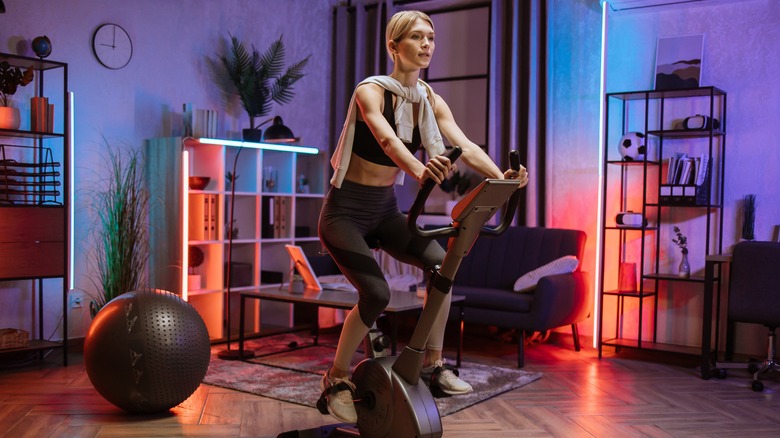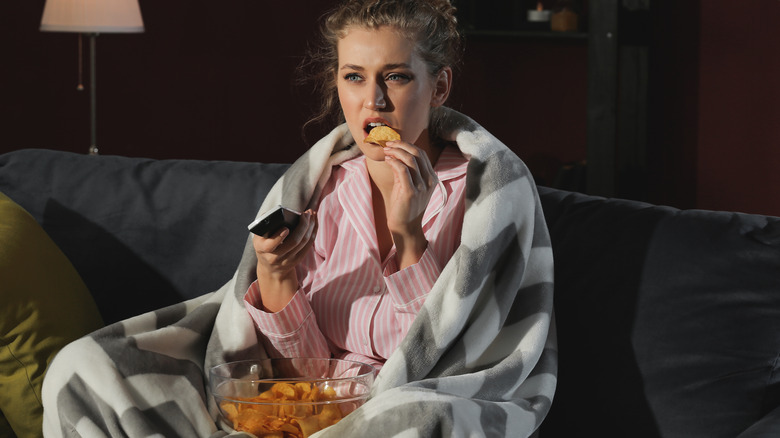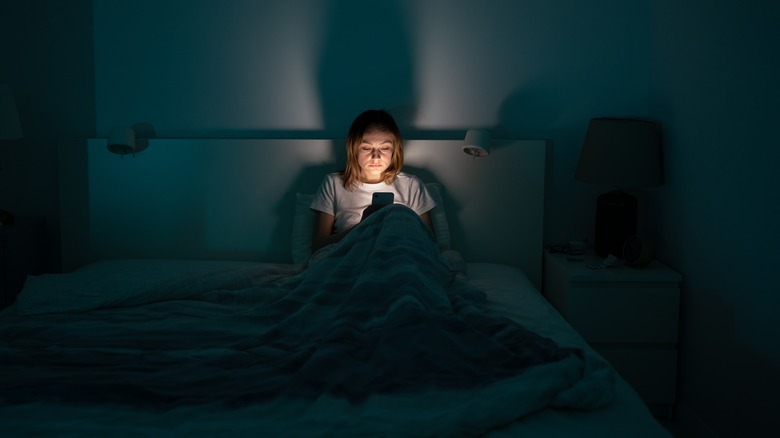Stimulating Habits To Avoid If You Want A Good Night's Sleep
The old adage "you snooze, you lose" might be appropriate for grabbing the last break room donut at work. But this snarky quip couldn't be further from the truth for the hundreds of millions of people who suffer from sleeplessness every night. For these sleep-deprived individuals, the actual loss comes from lying in bed, staring at the ceiling until the wee hours of the morning, for the umpteenth time that week.
Indeed, sleep can be elusive for several reasons, some of which are easier to remedy than others. While medications and other forms of therapy might prove beneficial for some, this isn't the case for everyone. Whether you consider yourself an insomniac or recent life events have made it a bit harder to doze off into dreamland, there's a chance some of your daily habits might be to blame.
Sleep solutions often focus on the act of sleeping itself — medications to take, tools to utilize, or breathing exercises to do immediately before bedtime. However, these stimulating habits could damage your sleep hygiene long before slipping under the covers.
Elevating your body heat and heart rate
It's not unreasonable to assume exercise before bed could help tucker the body out and make it more susceptible to sleep. Still, scientific evidence suggests that how you exercise is critical. Per John Hopkins Medicine, high-intensity cardio activity releases endorphins and raises core body temperature, making it more difficult for the brain to get into sleep mode.
Alternatively, low-intensity exercise like yoga, gentle movement, or even taking on a few household chores at a steady pace can help satiate your body's need for activity without sacrificing your sleep schedule.
If you enjoy steaming hot showers or baths, you might also want to rethink when you partake in your hygiene rituals. Like high-intensity exercise, a too-hot shower can elevate the body's temperature, signaling your brain to stay awake longer. This can be avoided by taking lukewarm showers or baths, or you can shower in the morning or a few hours before bed.
Consuming the wrong late-night snacks
While some studies and diets suggest snacking late at night is harmful no matter what you consume, let the person who hasn't reached for something to munch on after dinner throw the first stone, right? After all, lying in bed with a rumbling stomach won't help you fall asleep any faster. So, it's important to choose the right bedtime snacks that won't disturb your natural sleep cycle.
A 2016 study published in the Journal of Clinical Sleep Medicine found a correlation between high saturated fat and sugar intake and shallower sleep. However, the authors mention more research needs to be done to prove diet management is an effective form of sleep therapy.
Nevertheless, it's generally a good rule of thumb to avoid highly caffeinated beverages, sugar, and high-saturated fatty foods like red meat, baked goods, and ice cream. For a more restful night's sleep, reach for herbal teas and high-fiber, low-saturated fatty foods like avocados, nuts, or fatty fish.
Binge-streaming, -scrolling, and -stimulating
Remember when your parents scolded you for staying up too late watching TV? As much as your inner child might have hated it, they weren't wrong. Smartphones, tablets, computers, TV monitors, and other common devices emit blue light, which a study published in the Journal of Biophotonics found to have the most negative effect on circadian rhythms, disaffecting the body's ability to sleep.
Blue light filtering glasses and night mode settings on electronic devices might help reduce the effect of blue light on your sleep schedule, but it's not just the color of your screen that's doing damage. When the brain is highly stimulated, it's harder for your body to doze off.
Thus, if you're struggling to fall asleep at night, binging your latest streaming obsession — or even reading a highly interesting book or magazine — can do more harm than good. If screen or reading time is a non-negotiable for your nighttime schedule, consider sticking with something a bit boring to avoid piquing your interest (and, in turn, wakefulness) too much. Happy snoozing!



